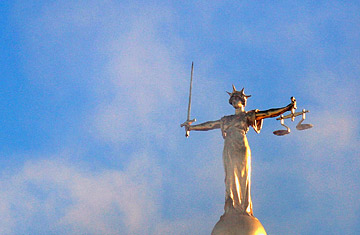
In 2006, Icelandic investment bank Kaupthing sued Ekstra Bladet, a Danish newspaper, over articles critical of its dealings. Nothing extraordinary about that. What was surprising was where Kaupthing chose to bring the libel case: not in Iceland or Denmark, but London. Arguing that the offending articles had been translated into English and posted online, the bank decided to pursue the newspaper through England's courts. Ekstra Bladetsettled the case in 2008, before a trial could start, and agreed to cough up what Kaupthing described as "substantial damages".
When it comes to suing for libel, London is the undisputed global capital. Exploiting English laws seen as skewed heavily toward claimants, and often involving publications with only a whiff of a link to the U.K., overseas plaintiffs have clamored to bring cases to London in recent years. So much so, says Mark Stephens, a leading media lawyer and partner at Finers Stephens Innocent in London, the city has become "a town called sue — anything viewed or read within the jurisdiction of the English courts can be sued upon."
Convinced the rules are choking debate and chilling investigation by journalists, bloggers, academics and medics, Index on Censorship and English PEN, two organizations promoting freedom of expression in Britain, published a slew of recommendations Nov. 10 aimed at making the laws fairer. "When we have instances where people are afraid to raise questions, whether it be about medical instrumentation or the funding of terrorism, we have a real problem," says Padraig Reidy, news editor at the Index on Censorship. Newspaper journalists in particular, he adds, are choosing to "not get involved with certain issues if they know it could get them involved in a lengthy and expensive libel battle."
What annoys critics most is the fact that, thanks in large part to the Internet, the threat of a libel suit hangs over writers and publishers outside Britain. While plaintiffs in the U.S. must demonstrate that an online publication is targeted at the state in which the action is brought, offending material originating elsewhere need technically only be read once in England for a trial to be permitted by its courts. Ukrainian tycoon Rinat Akhmetov was able to sue in London when, in 2007, he issued proceedings against a Ukraine-based website over content posted in Ukrainian but viewed by readers in England. Award-winning British cardiologist Peter Wilmshurst is being sued in England by a U.S. manufacturer of heart implants after remarks he made on the effectiveness of its devices at a conference in the U.S. were reported by a local online journal and then read by a handful of medics in the U.K.
There's another reason litigants like London: in most other countries, those accused of libel are considered innocent until proven guilty, but under the English system, the burden of proof lies with the accused, not the plaintiff. What's more, while cases cost little to mount — lawyers offer complainants no win, no fee deals — expensive defense counsel fees and lengthy trials have pushed rates many times higher than the average cost of libel cases elsewhere in Europe. For many defendants, not always able to recover costs even in the event of a legal victory, it simply won't pay to stand up for themselves. "Many can't afford to prove the truth of their publication," says media lawyer Stephens.
Others have retreated from making disapproving statements in the first place. England's laws have "served to discourage critical media reporting on matters of serious public interest, adversely affecting the ability of scholars and journalists to publish their work," the U.N. Human Rights Committee concluded in a report last year. Scientists are feeling deterred, too. Cases of academics, medics and even patients taking down critical published comments under threat of legal action are on the rise, says Síle Lane, public liaison at the London-based Sense about Science, which promotes reliable scientific evidence in public debates.
The threat of expensive libel action could even stop some organizations from publishing in England altogether. According to a recent memo submitted to a U.K. parliamentary committee on behalf of several U.S. media outlets including The New York Times and The Los Angeles Times, publishers could soon halt publication of their newspapers in the U.K., and block access to web content. "They can no longer risk losing millions of dollars in libel action which they would never face under U.S. law," the submission, released last week, read.
While some U.S. states have enacted laws shielding their citizens from the penalties arising from English libel cases, strengthening the protection of free speech through reform of the system is vital, campaigners say. Among the changes recommended by the Index on Censorship and English PEN: at least 10% of copies of a relevant publication should be circulated in England for a case involving that title to be heard here. The groups also advocate capping costs and damages. With the U.K. parliamentary committee set to deliver its own report into the libel system soon, Britain's Ministry of Justice said it would "carefully consider" the suggestions. Writers everywhere will be hoping they're true to their word.
